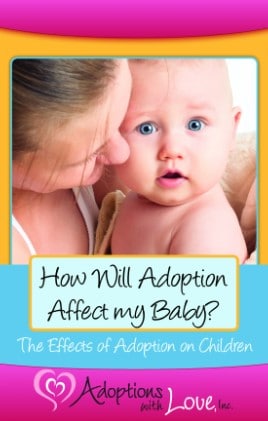Are you pregnant and considering adoption for your baby? In your heart, you may feel that adoption is the most positive option for your baby. This choice will allow your child to grow and thrive in a loving, devoted adoptive family. You may know that, through adoption, your child will encounter greater opportunities and experiences than you can offer at this time.
As an expectant/birth mother, you want what is best for your child. Still, you are worried about your child’s happiness and wonder how he or she will feel years down the road. You may worry that adoption will bring your child more problems than it will positivity as he or she grows. So you are asking, “What problems will my child face after the adoption takes place?”
For over 34 years, Adoptions With Love has seen adoptions unfold. We have watched our adopted children grow up to be successful, joyful adults. We have celebrated the good times and worked with them through challenges life brings. We have helped many adoptees find and contact their birth parents. We have witnessed beautiful relationships stem from those reunions.
We want to assure you that, if you choose adoption, your child will have countless positive experiences. In our most recent infographic, we discussed the benefits of adoption and the positive outcomes that adoption can bring to children. We found that adopted children typically lead lives no different from their non-adopted peers. Sometimes, they even have better experiences than the general population. For example, children who were adopted are more likely to be read to or sung to every day. The majority of adopted children are in very good health, are engaged in school, live in safe neighborhoods, and exhibit positive social behaviors.
While they often have positive experiences overall, many adopted children will encounter challenges at different points in their lives. They have experiences that are unique to being adopted, which can then have an impact on their feelings and behaviors growing up. While every child has a different adoption experience, these are three common challenges that adopted children face as they grow.
1. Feelings of Loss or Grief:
As adopted children mature and try to understand their adoption, many will develop feelings of loss, grief, anger, or anxiety. They may feel as though they lost their birth parents, siblings, language, or culture. This grief may also stir feelings of uncertainty. Adopted children may wonder “What is wrong with me?” or “Will my adoptive parents leave me, too?
Constant communication is essential for adopted children to overcome their anxieties. When adoptive parents acknowledge their child’s emotions and provide an outlet for self-expression, adopted children typically fare well. Those who feel especially secure in their adoptive family or have an open adoption arrangement are also better able to manage their uncertainties.
2. Issues with Identity Formation:
Identity development begins in childhood and becomes increasingly prominent through the teenage years. Adolescence is when children start to understand and explore who they are, where they came from, and their purpose in life. For adopted children, filling in the blanks can create an extra challenge. Adoptees in closed adoptions may wonder why they were placed for adoption, what became of their biological parents, if they have siblings, and whether they look like their birth family.For adopted children, genetics often hold a particularly special place.
Adoptees often want to know if they resemble their biological family in personality or physical traits. We have heard stories from adoptees who, as children, always looked for their birth families on the streets. Adoptees also want to know their medical backgrounds. Having access to their genetic history allows children to know about any diseases or conditions that may run in their family. For these reasons, open adoption is especially beneficial for adopted children. It gives them tangible answers to important questions.
3. Self-Esteem:
As they grow, adopted children may face issues with self-esteem. They may view themselves as different, out-of-place, or unwelcome in social circles. At times, they may feel as though they do not fit in with others. This lack of self-confidence usually arises in those who feel embarrassed or ashamed of their adoption.
When adopted children are raised to see their adoption in a positive light, they are more likely to have a better sense-of-self growing up. When adoptees have good relationships with their adoptive and birth families, they also tend to have higher self-esteem and self-worth.
Through experience and research, we have found that open adoption often brings the most positive outcomes to adopted children. Open adoption gives adoptees a sense of wholeness and helps them overcome any challenges growing up. They can understand who their birth parents really are, rather than fantasizing. Children in open adoptions do not have to question where they came from, what their biological parents look like, or wonder why they were placed for adoption. Instead, they can carry the pride of knowing that both their adoptive and biological families love them unconditionally.
Choosing an open adoption means giving your child an invaluable gift: a sense of self. It means giving your child the opportunity to communicate with you and put all of his or her puzzle pieces together. It means giving your child the chance to get to know you.
While we find open adoption to be very positive, we know that it is not right for everyone. At Adoptions With Love, we also offer semi-open and closed adoption plans to any expectant/birth parents considering adoption. If you would like to discuss your options or learn more about adoption, please call us at 1-800-722-7731.
To learn more about the effects of adoption on children, please download our free eBook by clicking below.
